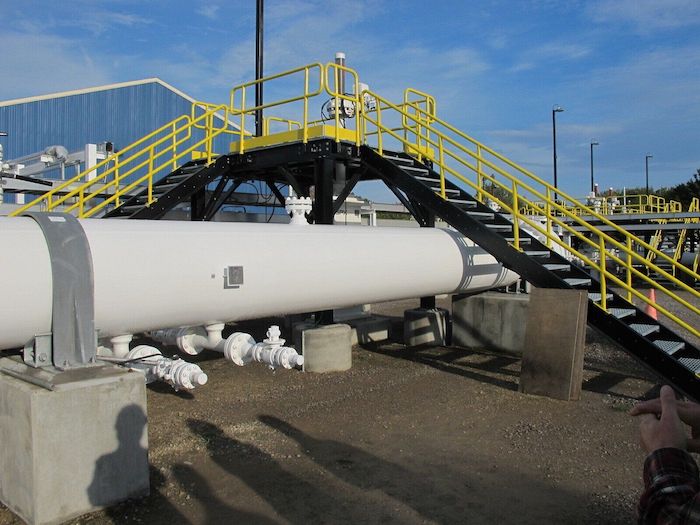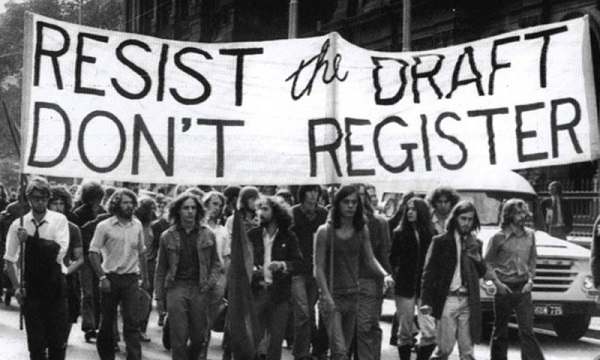Business
Canada ‘extremely concerned’ about fate of Line 5 pipeline in Wisconsin, embassy says

Canada’s embassy in Washington says it is “extremely concerned” about the fate of the Line 5 cross-border pipeline. This photo taken in October 2016 shows an aboveground section of Enbridge’s Line 5 at the Mackinaw City, Mich., pump station. THE CANADIAN PRESS/AP-John Flesher
By James McCarten in Washington
Canada’s embassy in Washington says it is “extremely concerned” about the fate of the Line 5 cross-border pipeline.
A court hearing Thursday in Wisconsin could determine whether the pipeline, owned and operated by Enbridge Inc., is allowed to continue operating.
“The energy security of both Canada and the United States would be directly impacted by a Line 5 closure,” the embassy said in a statement.
“At a time of heightened concern over energy security and supply, including during the energy transition, maintaining and protecting existing infrastructure should be a top priority.”
The Bad River Band of Lake Superior Chippewa says spring flooding has heightened the risk of a rupture and it wants a federal judge to shut the line down.
A strongly worded statement from the embassy says doing so would endanger more than 33,000 U.S. jobs and US$20 billion in economic activity.
Canada argues that Line 5 is a vital energy conduit across the U.S. Midwest and an economic lifeline for Alberta, Saskatchewan, Ontario and Quebec.
The Indigenous band fears a rupture would foul not only a key watershed on its territory, but also the waters of Lake Superior.
Canada has already invoked a 1977 pipelines treaty with the U.S. in both Wisconsin and Michigan, where Michigan’s attorney general is also in court trying to get the pipeline shut down.
Talks under that treaty have been ongoing for months, with the latest session taking place last month in Washington.
“Canada invoked the treaty’s dispute settlement provisions because actions to close Line 5 represent a violation of Canada’s rights under the treaty to an uninterrupted flow of hydrocarbons in transit,” the embassy said.
“If a shutdown were ordered because of this specific, temporary flood situation, Canada expects the United States to comply with its obligations under the 1977 Transit Pipelines Treaty, including the expeditious restoration of normal pipeline operations.”
Spring flooding has washed away significant portions of the riverbank where Line 5 intersects Wisconsin’s Bad River, a meandering, 120-kilometre course through Indigenous territory that feeds Lake Superior and a complex network of ecologically delicate wetlands.
The band has been in court with Enbridge since 2019 in an effort to compel the pipeline’s owner and operator to reroute Line 5 around its traditional territory — something the company has already agreed to do.
But the flooding has turned a theoretical risk into a very real one, the band argued in an emergency motion last week, and wants the pipeline closed off immediately to prevent catastrophe.
“There can be little doubt now that the small amount of remaining bank could be eroded and the pipeline undermined and breached in short order,” the band’s lawyers argued.
“Very little margin for error remains.”
Line 5 meets the river on Indigenous territory just past a location the court has come to know as the “meander,” where the riverbed snakes back and forth multiple times, separated from itself only by several metres of forest and the pipeline.
At four locations, the river was less than 4.6 metres from the pipeline — just 3.4 metres in one particular spot — and the erosion has continued in recent days at an “alarming” rate, the motion said.
In one case, so-called “monuments” installed to measure the losses show that where there was more than 10 metres of riverbank in early April before the flooding began, only 3.7 metres remained as of last Tuesday.
“Significant erosion is continuing as of the filing of this motion, and the evidence strongly suggests that further bank loss could be substantial and result in exposure and rupture of the pipeline.”
Wisconsin district court Judge William Conley will hear oral arguments on the motion Thursday. It’s not clear when he’ll decide whether to grant an injunction that would require Enbridge to shut down the pipeline and purge its contents.
Enbridge has described the motion as “truly outrageous” and unnecessary: “There is no pipeline safety issue and certainly no cause for alarm.”
This report by The Canadian Press was first published May 16, 2023.
2025 Federal Election
The “Hardhat Vote” Has Embraced Pierre Poilievre

 David Krayden
David Krayden
Blue collar and unionized workers are supporting Pierre Poilievre and the CPC
When President Richard Nixon won a landslide in his 1972 reelection, he did so by broadening his own personal popularity and the appeal of the Republican Party to blue collar and unionized workers. It was called the hardhat vote and many working people embraced Nixon because he seemed to be talking the same language as they were. Nixon talked about law and order and getting tough on crime; safer streets and harsher penalties for serious crime. Although unionized workers had traditionally voted for the Democratic Party and seen the Republicans as the party of the wealthy, by 1972 the Democrats had moved far to the left on social issues and were completely out of touch with average Americans who saw Democratic presidential nominee Sen. George McGovern as being soft on crime and approving of the anarchy on the streets.
It’s precisely the language that Conservative Party of Canada leader Pierre Poilievere is speaking in the 2025 federal election. As support for the New Democratic Party has collapsed throughout the election campaign, don’t think most of it is going to the Liberal Party. Poilievre has been targeting blue collar workers for years with his emphasis on the trades and talking about middle class tax cuts and safe streets. A factory or construction worker is middle class and just want an affordable lifestyle for their families. They don’t have a lot of time for the woke underbelly of the Liberals or the NDP and are increasingly reluctant to support either party because both have appealed to elites.
Listen to Karl Lovett, the president of the Local 773 of the International Brotherhood of Electrical Workers, talk about Carney corruption and why he is supporting Poilievre and the CPC in 2025.
“Mark Carney also failed to pay $5 billion in Canadian taxes by hiding his company’s assets in Bermuda above a bike shop. Hard to believe that information comes from Canada’s NDP, or at least who is left of them, because the irony is, Mark Carney has eaten all those people alive. Even the mayor of Lima has warned Canadians not to vote for Mark Carney, and why for ripping him off the poorest of the poor people in Peru. That’s who he ripped off,” Lovett said.
“Listen, there are countless other outrageous examples proving that Mark Carney doesn’t give a damn about the Canadian working man. And now, as prime minister, which he’s not, Carney is promising to put carbon tax and tariff on the auto industry. It’s another rip-off screen that’s right. We’re getting punched by Trump on one side of the border, and Carney plans to punch us on this side of the border, also pretending it’s all about climate change, and now he’s made millions off the workers’ backs. He wants more than money. He wants more power. He wants all of the power to do whatever he wants to do. Mark Carney cannot be trusted with this power. Mark Carney cannot be trusted to protect workers,” Lovett continued.
The union leader told a cheering crowd that “Mark Carney is in it for himself, and when he loses this election, you can bet Mark Carney is going to leave Canada in a New York minute. But there’s hope, there’s hope, there’s our last hope. His name is Pierre Poilievere – the .only hope for Canadian workers. You see Mark Carney fooled Justin Trudeau. We can’t let him keep fooling us.”
“Local 773, which I represent, knows Pierre Poilievre very well. We can proudly tell you that Pierre has our back. Pierre has been putting Canadian people to work and Canadian workers. First, local 773 began working with Pierre Poilievre, the Conservative Member of Parliament Chris Lewis, some years ago, when it became all too clear that the Liberal Party had zero interest in helping out workers. Upon winning the leadership of the party, Pierre made Local 773 his very first priority, he came to my union hall. Pier made the Local 773 Visitor Training Center, and he met all our workers, and he made a pledge to me; he’s not going to turn his back on us, and I believe him,” Lovett said.
Toronto Sun columnist Joe Warmington agreed with me and you can hear that entire interview, below. “Labor wants to work, and they want to, you know, build things, and they want those good, paying jobs, and that’s what Poilievre has always been about, you know.”
“He wants more power. He wants all of the power to do whatever he wants to do. Mark Carney cannot be trusted with this power. Mark Carney cannot be trusted to protect workers,”
“Again, it’s hard to know, but I always felt … and I still think that Poilievre is going to pull this off because of these reasons that you’ve raised today, I never really bought into and again, I’m just one person’s opinion, and I go on the ground. In the air, the polls are saying, I know there’s this main street poll today, maybe it’ll swing differently. But in the air, it says one thing, and on the ground, it says another thing. And that clip you just showed, that’s the ground, that’s where the workers are, that’s where the families are.”
2025 Federal Election
Poilievre will cancel Mark Carney’s new Liberal packaging law and scrap the Liberal plastic ban!

From Conservative Party Communications
Conservative Leader Pierre Poilievre promised today that a new Conservative government will stop Mark Carney’s proposed Liberal food tax and scrap the existing Liberal plastic ban. Poilievre will:
- Stop proposed new labelling and packaging requirements that will raise the cost of fresh produce by as much as 34% and cost the average Canadian household an additional $400 each year.
- Scrap the Liberal plastics ban, including the ban on straws, grocery bags, food containers and cutlery, and other single-use plastics, letting consumers and businesses choose what works for them.
- Protect restaurants, grocers, and low-income Canadians from one-size-fits-all packaging rules that disproportionately affect those who can least afford it.
“After the Lost Liberal Decade, many Canadians can barely afford to put food on the table. And now Mark Carney and the Liberals want to make it even harder with a new food packaging law that will raise the price of food–again,” said Poilievre. “A new Conservative government will keep food prices down by scrapping the Liberal plastic ban and stopping Carney’s new Liberal food tax.”
After a decade of out-of-control spending and massive tax increases, families are spending $800 more on food this year than they did in 2024, and food banks had to handle a record two million visits in a single month. In Montreal, 44 percent of CEGEP students are experiencing some form of food insecurity, while places like Hawkesbury, Kingston, Toronto and Mississauga have all declared food insecurity emergencies.
And food prices are still rocketing upwards, surging by 3.2% over the last year, with no end in sight. In the last month alone, food inflation increased by 1.9 percentage points—the largest monthly jump in food prices in decades.
As if this wasn’t bad enough, Liberals have made life even more expensive and inconvenient for Canadians by banning plastics – including everything from straws to bags to food packaging. The current Liberal ban on single-use plastics will cost Canadians $1.3 billion dollars over the next decade.

Now Mark Carney wants to make it worse by adding complicated and costly new food packaging rules that will drive up the price of food even more–in effect, a new Liberal food tax. Plastic food packaging makes up 1/3 of all plastic packaging in Canada. The proposed Liberal food tax will cost the average Canadian household an additional $400 each year, waste half a million tonnes of food, decrease access to imported fruit and produce, and increase food inflation. The Chemistry Industry Association of Canada has also warned that this tax will put up to 60,000 Canadians out of work.
“The Liberals’ ideological crusade against convenience has already driven up food prices and the last thing Canadians need is Mark Carney’s new food tax added directly to your grocery bill,” said Poilievre. “The choice for Canadians is clear, a fourth Liberal term that will make food even more expensive or a new Conservative government that will axe the food tax and bring back straws, grocery bags and other items, to make life more affordable and convenient for Canadians – For a Change.”
-

 espionage2 days ago
espionage2 days agoEx-NYPD Cop Jailed in Beijing’s Transnational Repatriation Plot, Canada Remains Soft Target
-

 2025 Federal Election2 days ago
2025 Federal Election2 days agoAllegations of ethical misconduct by the Prime Minister and Government of Canada during the current federal election campaign
-

 John Stossel2 days ago
John Stossel2 days agoClimate Change Myths Part 1: Polar Bears, Arctic Ice, and Food Shortages
-

 2025 Federal Election2 days ago
2025 Federal Election2 days agoBREAKING from THE BUREAU: Pro-Beijing Group That Pushed Erin O’Toole’s Exit Warns Chinese Canadians to “Vote Carefully”
-

 Daily Caller2 days ago
Daily Caller2 days agoTrump Executive Orders ensure ‘Beautiful Clean’ Affordable Coal will continue to bolster US energy grid
-

 Daily Caller2 days ago
Daily Caller2 days agoDOJ Releases Dossier Of Deported Maryland Man’s Alleged MS-13 Gang Ties
-

 Opinion2 days ago
Opinion2 days agoLeft Turn: How Viet Nam War Resisters Changed Canada’s Political Compass
-

 Energy2 days ago
Energy2 days agoStraits of Mackinac Tunnel for Line 5 Pipeline to get “accelerated review”: US Army Corps of Engineers












